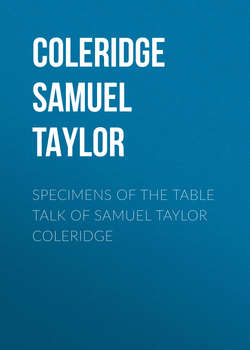Читать книгу Specimens of the Table Talk of Samuel Taylor Coleridge - Coleridge Samuel Taylor - Страница 31
TABLE TALK
August 29. 1827
ОглавлениеJEREMY TAYLOR.—HOOKER.—IDEAS.—KNOWLEDGE
Jeremy Taylor is an excellent author for a young man to study, for the purpose of imbibing noble principles, and at the same time of learning to exercise caution and thought in detecting his numerous errors.
* * * * *
I must acknowledge, with some hesitation, that I think Hooker has been a little over-credited for his judgment.
Take as an instance of an idea the continuity and coincident distinctness of nature; or this,—vegetable life is always striving to be something that it is not; animal life to be itself.35 Hence, in a plant the parts, as the root, the stem, the branches, leaves, &c. remain after they have each produced or contributed to produce a different status of the whole plant: in an animal nothing of the previous states remains distinct, but is incorporated into, and constitutes progressively, the very self.
* * * * *
To know any thing for certain is to have a clear insight into the inseparability of the predicate from the subject (the matter from the form), and vice versâ. This is a verbal definition,—a real definition of a thing absolutely known is impossible. I know a circle, when I perceive that the equality of all possible radii from the centre to the circumference is inseparable from the idea of a circle.
35
The reader who has never studied Plato, Bacon, Kant, or Coleridge in their philosophic works, will need to be told that the word Idea is not used in this passage in the sense adopted by "Dr. Holofernes, who in a lecture on metaphysics, delivered at one of the Mechanics' Institutions, explodes all ideas but those of sensation; whilst his friend, deputy Costard, has no idea of a better-flavoured haunch of venison, than he dined off at the London Tavern last week. He admits (for the deputy has travelled) that the French have an excellent idea of cooking in general; but holds that their most accomplished maîtres de cuisine have no more idea of dressing a turtle, than the Parisian gourmands themselves have any real idea of the true taste and colour of the fat." Church and State, p. 78. No! what Mr. Coleridge meant by an idea in this place may be expressed in various ways out of his own works. I subjoin a sufficient definition from the Church and State, p. 6. "That which, contemplated objectively, (that is, as existing externally to the mind,) we call a law; the same contemplated subjectively, (that is, as existing in a subject or mind,) is an idea. Hence Plato often names Ideas, Laws; and Lord Bacon, the British Plato, describes the laws of the material universe as the ideas in nature. "Quod in natura naturata Lex, in natura naturante Idea dicitur." A more subtle limitation of the word may be found in the last paragraph of Essay (E) in the Appendix to the Statesman's Manual.—ED.
